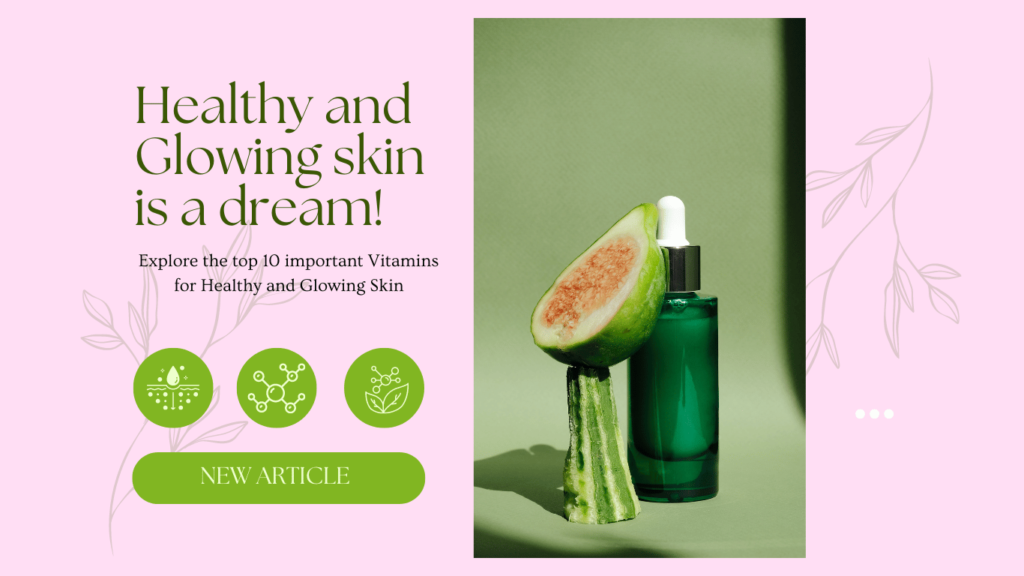Knowing which vitamins are the best for skin health is essential if you want to have beautiful, healthy and glowing skin. This detailed guide covers these important vitamins for healthy and glowing skin. In this guide we also see their skin-benefiting properties, and how to include them in your routine every day for glowing skin.
The Importance of Vitamins for healthy and glowing skin
Healthy and bright skin depends not only on external skincare, but also depends on the nutrients you provide to your body. Vitamins are essential for keeping skin healthy because they promote a number of processes. These processes are production of collagen, cell renewal, and defense against environmental harm.
1. Vitamin A: Enhancing Skin Renewal
Vitamin A is a powerful vitamin that promotes cell turnover and collagen formation. It encourages skin regeneration, which enhances skin texture and helps to lighten dark spots. Vegetables including carrots, sweet potatoes, and leafy greens are high in vitamin A.
2. Vitamin C: Brightening and Protecting
Vitamin C is a powerful antioxidant that brightens skin, decreases hyper-pigmentation, and protects our skin against UV rays. Citrus fruits, berries, and bell peppers can help you get more vitamin C, which can lead to bright skin.
3. Vitamin E: Nourishing and Moisturizing
Vitamin E is another vitamin that nourishes and moisturizes the skin while protecting it from damage caused by free radicals. It is frequently found in nuts, seeds, and oils such as almond and sunflower oil.
4. Vitamin D: Supporting Skin Health
Vitamin D, also known as the “sunshine vitamin,” is essential for the development and maintenance of skin cells. Your skin may benefit from going outside or from eating foods high in vitamin D, such as fatty fish and dairy products.
5. Vitamin K: Minimizing Dark Circles and Bruises
In addition to being necessary for blood clotting, vitamin K helps lessen the visibility of dark circles beneath the eyes. Add broccoli, Brussels sprouts, and leafy greens to your diet to be sure you are getting enough vitamin K.
6. Biotin (Vitamin B7): Strengthening Hair and Nails
Vitamin B7, also referred to as biotin, is necessary for strong hair, skin, and nails. By strengthening keratin structures, it encourages skin that is healthier and durable. Nuts, seeds, and eggs are great providers of biotin.
7. Niacin (Vitamin B3): Improving Skin Texture
Vitamin B3, or niacin, decreases inflammation and increases moisture to enhance the texture and tone of the skin. In order to enjoy niacin advantages, consume nutritious meats, beans, and whole grains.
8. Vitamin B Complex: Regulating Oil Production
B-complex vitamins, such as Biotin and Niacin, assist control oil production, avoiding acne and maintaining healthy skin. Or think about eating meals like leafy greens and whole grains, or take a B-complex vitamin.
9. Zinc: Healing and Protecting
Zinc is necessary for immune system performance, healing wounds, and acne prevention. It also promotes collagen formation and shields the skin from UV rays. Consume foods high in zinc, such as red meat, oysters, and pumpkin seeds.
10. Omega-3 Fatty Acids: Maintaining Skin Barrier
Walnuts, flaxseeds, and fatty fish are good sources of omega-3 fatty acids, which support supple skin by limiting moisture loss and maintaining the skin’s barrier function.

Vitamins into Your Skincare Routine
The following advice should be taken into consideration to fully utilize the benefits of these vitamins for healthy, glowing skin:
- Balanced Diet: To make sure you’re getting a wide range of vitamins and minerals, eat a variety of foods high in nutrients.
- Supplements: If you think you might need to take supplements to make up for any nutritional deficiencies, speak with a doctor first.
- Topical Products: Seek out serums, moisturizers, and face masks that are enhanced with vitamins for your daily skin care routine.
- Sun Protection: Although vitamin D is essential, you should always shield your skin from too much sun exposure to avoid harm.
Frequently Asked Questions (FAQs)
Are there any adverse effects from using vitamin supplements for skin health?
Depending on the person and dosage, side effects might change. To prevent any possible negative effects, speak with a healthcare provider before beginning any new supplement plan.
How long does it take to start noticing benefits when using these vitamins in your skincare practice?
Depending on factors including skin type, consistency, and general health, results might differ. Noticeable changes can be observed usually after a few weeks to months of consistent use.
Are these vitamins included to any particular skincare products?
Yes, these vitamins are included in a lot of skincare products including masks, moisturizers, and serums. Seek out goods branded with certain vitamins for advantages that are special to you.
Can some skin issues like acne or aging be helped by these vitamins?
Actually, vitamins like A (retinoids) can assist with acne, while antioxidants like C and E can prevent symptoms of aging by encouraging the creation of collagen and lowering oxidative stress.
Is there a daily amount of these vitamins that should be taken for the best possible skin health?
Recommendations for daily consumption differ depending on an individual’s age, gender, and health. For individualized advice, speak with a nutritionist or healthcare professional.
Conclusion: Achieving Healthy and Glowing Skin
To sum up, these ten vitamins are important for having healthy and glowing skin. Through the consumption of a diverse range of healthy foods along with vitamin supplements, you can improve the overall health of your skin and get a glowing complexion. Don’t forget to seek the opinion of a dermatologist or other healthcare expert for specific guidance based on the particular needs of your skin. Take advantage of these important vitamins a priority now to ensure a better and healthier tomorrow.

